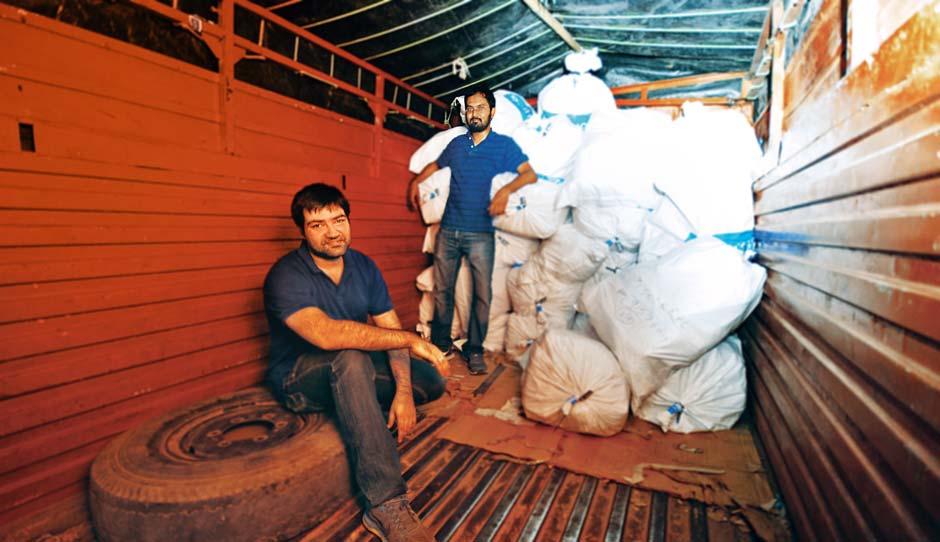How Delhivery Delivers Profits & Performance
- BY Sonal Khetarpal
 In Blog
In Blog 14994
14994 0
0

In March 2011, Sahil Barua and Mohit Tandon left their consulting jobs at Bain & Company to start an e-commerce venture. As they researched, they found a huge market need in logistics for e-commerce companies. So, Barua and Tandon, along with three other co-founders, set up Delhivery in June 2011. Since then, this Gurgaon-based company has grown into a burgeoning logistics empire with three verticals—fulfilment (warehousing and packaging); omni-channel (technology services to online retailers); and data services (route optimisation and real-time shipment tracking). Today, this Rs250-crore company does 55,000 transactions a day for e-commerce giants such as Flipkart, Snapdeal, eBay, Amazon and Jabong. Venture capital has helped enable this growth. Delhivery is on the verge of closing a third round of funding, this time a massive Rs175-crore. Barua and Tandon credit two things for their rapid scale up—working more than 12 hours a day, and making sure they spend one day a week working in the trenches as a delivery boy, or in cataloguing and packing deliveries.
Sahil Barua: I am one of the first persons to reach office at 8.30 am. Everyone comes around 9am. The first thing we do is look at the MIS reports. So, basically we look at how many shipments were delivered yesterday, the number to be delivered today, the revenue it generated and lastly, the clientsthat gave us maximum business. This gives us a comprehensive view of where the business stands for that day and the company’s current capital situation.
Mohit Tandon: After looking at these reports, there is just no normal day. Sahil and I are like floating resources in the company. Wherever we think we can add value, we commit our time over there. For instance, currently we are amidst expanding our fulfillment side of business and opening a warehouse in Surat. So, our focus now is to make sure we set up business in a new city efficiently, and that the overall strategy we need to adopt is the right way to go.
SB: Even though we’re pulled into many things, we have neatly divided the different business verticals amongst the five of us. It wasn’t like this initially. Since our second year, we’ve been adding a new division every year so it became extremely important that the roles for the five of us were well defined. This eases decision-making because the person in charge of that vertical gets the final say in case we can’t arrive at a consensus. Mohit looks into business development and external communications, Kapil Bharati on technology, Bhavesh Manglani on delivery and shipments, Suraj Saharan on HR and fulfilment side of the business and I focus on finance and operations. Obviously, since Mohit and I work across multiple functions we generally need to have a broader view of the entire business.
Where the rest of the world is concerned, I will do anything to defend my team in front of them."- Sahil Barua
MT: The way we work is quite simple. We don’t have any formal processes for meetings in the company. If we need an update, we just go to those team members’ desk, pull them into the meeting room and have a quick discussion. So, it is always a short meeting with one agenda and one team. This helps to keep discussions to the point. That way, we meet each other frequently, sometimes every day, and are aware of what is going on. Nothing comes as a big surprise then at the end of the week. In spite of the same working style, we do have our stark personality differences. I am a bit more hands off and should follow up more with my team. On the other hand, Sahil is always on his toes and needs to be updated often.
SB: That’s true. I can’t sit on my computer for too long. After every 20 minutes I’ll get up and go talk to a team member. Thanks to this, I know everyone in our office, almost 200-plus people, by their first name. Actually, I think this is my most effective work habit as it keeps me quite hands-on with my team. But, sometimes they do tell me to back off for a while. Yes, we have that kind of openness in the office where people can tell us what they think. This is because all five of us give our team members a lot of authority. We learnt this from our consulting days at Bain & Co. where employees were trusted and given a lot of authority, even to take client-related decisions. This is how we work in our company also. There have been cases where people have come back and said they don’t like this kind of authority. So, we tell them that if they can back their decision with good logic we will support their approach. At Bain, our managers went out of their way to ensure they had our back at all times. We follow that here too. Where the rest of the world is concerned, I will do anything to defend my team in front of them. But, if they have made a mistake, I will of course kick their butt when we are back in office.
MT: Delegating decision-making lets us concentrate on other important matters. In a growing company like ours, we not only have to take a lot of decisions but have to take them fast. At Bain, the time I use to take in making a single decision is the time I have now to take 10 decisions. Of course then there was a 99.99 per cent probability that the well-thought-out decision would be correct. But, we don’t have that kind of luxury of time here. In a fast-growing company, we are prepared for 2-3 decisions to be wrong. But, there will be seven that will be correct, and we are happy with that.
No decision is ever made without looking at the relevant data in hand. People who work with us need to understand and talk data." - Mohit Tandon
SB: That is how we have learnt and grown the business. None of us had any prior experience in the logistics space so we worked on the first principle and learnt on the ground. When we started the express delivery business, we delivered the packages ourselves to customers. When our client and also one of our first investors, Times Internet asked us to do warehousing for them in 2012, we worked in their warehouse for nine months. We stored, packed and dispatched shipments from there and when we were sure we understand what works and what does not, we started our first two warehouses, in Delhi and Chennai simultaneously.
MT: We still go and work at our facilities ourselves—whether at the hubs, processing centres or fulfilment centres. It is usually once or twice a week. We take on a different role every time we go. Sometimes we will pack shipments in the warehouse or we can sort them in the processing centre or even take them to customers from the delivery centre. This helps us understand the problems people might face working in these roles and helps us to optimise the process for them.
 Tandon and Barua find delivering shipments and sorting packages in their warehouse- something they do once a week-hugely helpful in spotting process gaps.
Tandon and Barua find delivering shipments and sorting packages in their warehouse- something they do once a week-hugely helpful in spotting process gaps. SB: The number of shipments a delivery boy should carry, or the size of the packet in which he should carry these shipments have evolved from the insights we got while delivering parcels ourselves. These things might seem trivial but it makes a lot of impact to the process efficiency overall. We have made some very drastic changes also. The one we are currently working on is on routing. We are trying to map all the pin codes in the cities we deliver so that we can optimise the route in which the delivery boy delivers the shipments to customers. This will greatly help in saving fuel and time. This last mile route optimisation is something that no one has done in India. If we are able to do it, it will be a big achievement for us. Working at the processing centres is the favourite part of my job—not only for the learning we get but it makes me realise the enormity of work we all handle together as a team. I love seeing shipments coming in and out. If I don’t get time on weekdays, I go and spend time in the hub on a Sunday.
MT: In fact, we have made it mandatory for our teams also to go and work in these centres on a weekly basis. Ours is a process-driven business so people have to understand the operations in-and-out to be able to perform better. And, unfortunately, there is very little good talent in the industry. All the experienced people we have in this space joined companies like Blue Dart and its likes in 1980s. There are now 40-45 years old and we don’t like to hire them. We prefer young, energetic and analytical people who can fit the start up culture and are also, like us, ready to work on the ground. What we then do is keep a close watch on the results and track them very closely.
SB: Being result-focussed is another credo from Bain that we uphold in the organisation. Like Bain, in our company also, it is all about results and not reports. Every day we see how each of us has moved forward in business. It does not matter if it is a big step or a small one. It should be just a step ahead.
MT: To analyse that, we have developed several metrics in the organisation to track the results. Honestly, we have more metrics than we need! But, metrics is the best way to determine the trajectory of the company’s growth. We rely heavily on data. In any discussion, one question all of the co-founders always ask is—do we have the relevant data? It can be external data like some market research or internal data that we get from our tracking system. No decision is ever made without looking at the relevant data in hand. People who work with us need to understand and talk data.
SB: Even though we rely heavily on data, we do take decisions based on leaps of faith. Ours is a blend of old and new working habits. Beyond data, we don’t use any tech devices for work. In fact, I don’t even make lists on my computer. I have a huge white board next to my table. It is divided in two parts. One is where I write whatever project I am working on. The other is for anyone in office to use if they want my support for anything. So, every day I spend two to three hours on the white board. It gives me a visual reminder of what needs my intervention, issues that need to be tracked, and those that have to be solved. Mohit shares the white board with me but he doesn’t use it much. Bhavesh, Suraj and Kapil have their own white boards too. Actually, the white boards ensure transparency as everybody knows what we are working on.
MT: We all spend like forever in the office. We work six days a week and clock in 12-14 hours a day. It can go up to 16 hours too very easily if we don’t watch it. That does not leave us with much time for other things. But, then when you start a company with friends, you don’t really need a personal life. The professional is the personal. For now, all of us are keeping our heads down, and are focussed on accelerating our growth. Over the next two years, we want to have 12 more warehouses and expand the company’s presence in 150 more Indian cities. By then, hopefully, we expect to be five times larger.





























Add new comment